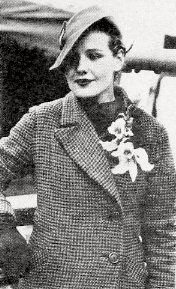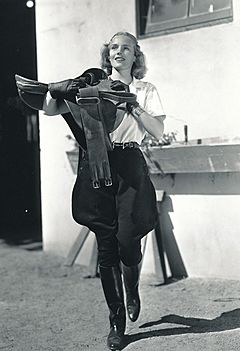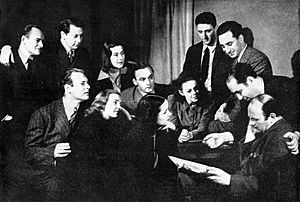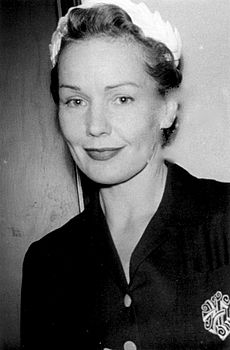Frances Farmer facts for kids
Quick facts for kids
Frances Farmer
|
|
|---|---|
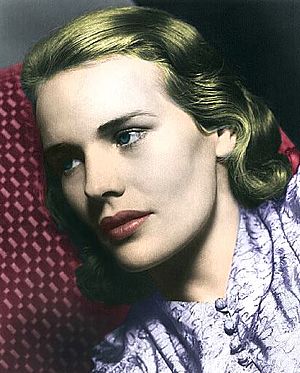
Farmer in 1938
|
|
| Born | September 19, 1913 Seattle, Washington, U.S.
|
| Died | August 1, 1970 (aged 56) Indianapolis, Indiana, U.S.
|
| Resting place | Oaklawn Memorial Gardens Cemetery, Fishers, Indiana |
| Alma mater | University of Washington |
| Occupation |
|
| Spouse(s) |
Leif Erickson
(m. 1936; div. 1942)Alfred Lobley
(m. 1954; div. 1958)Leland Mikesell
(m. 1958; div. 1963) |
Frances Elena Farmer (born September 19, 1913 – died August 1, 1970) was an American actress and TV host. She acted in many movies during her career. She became well-known for stories about her life, especially her health challenges that led to her spending time in hospitals.
Frances was born in Seattle, Washington. She started acting in school plays while studying at the University of Washington. After college, she performed in local theater. She then signed a movie contract with Paramount Pictures when she was 22. Her first movie was Too Many Parents (1936). She later got a main role with Bing Crosby in Rhythm on the Range (1936).
Frances was not happy with the roles she was offered. So, she returned to theater in 1937. She starred in the Broadway play Golden Boy. She also appeared in two other Broadway shows. However, she faced personal struggles and left a play based on a book by Ernest Hemingway.
Frances went back to Los Angeles. She took supporting roles in movies like World Premiere (1941). In 1942, stories about her difficult behavior began to appear. After some legal troubles and time in hospitals for her health, she was diagnosed with a mental illness. Her family asked for her to stay in a hospital in Washington. She remained there until 1950.
Frances tried to restart her acting career. She mainly worked as a TV host in Indianapolis on her own show, Frances Farmer Presents. Her last movie role was in The Party Crashers (1958). In the 1960s, she sometimes acted in local theater plays. In 1970, she was diagnosed with esophageal cancer. She died on August 1, 1970, at age 56.
After her death, two movies and several books were made about Frances. They focused on her time in hospitals. A book published after she died, Will There Really Be a Morning? (1972), told many stories. But much of it was later found to be untrue. Another book from 1978, Shadowland, also contained untrue stories. It claimed she had a serious medical procedure that never happened. A 1982 movie called Frances was based on this book. It showed these false events as true. This made people interested in her life again.
Contents
Life and Career
Early Life and Education (1913–1935)
Frances Elena Farmer was born on September 19, 1913. Her birthplace was Seattle, Washington. Her mother, Lillian, ran a boardinghouse. Her father, Ernest, was a lawyer. Frances had an older sister, Edith, and an older brother, Wesley. She also had an older half-sister, Rita.
When Frances was four, her parents separated. Her mother moved with the children to Los Angeles. Later, they moved to Chico, California. Her mother felt caring for the children made it hard to work. So, the children went back to Seattle to live with their father.
Frances's home life was not always stable. She later said this made her understand that adults could not always be depended on. She felt confused by moving between homes. The next year, her mother returned to Seattle. The family lived together, but her parents stayed separated. In 1929, when Frances was 16, her parents divorced.
In 1931, Frances was a senior at West Seattle High School. She won $100 in a writing contest. The contest was sponsored by Scholastic Magazine. Her essay was called "God Dies." She wrote that she wanted a "superfather" God. But she saw a world that seemed chaotic. She felt she was an agnostic, meaning she wasn't sure if God existed.
After high school, Frances went to the University of Washington. She first studied journalism. She worked many jobs to pay for school. These jobs included being an usher at a cinema. She also worked as a waitress and a tutor.
In her second year, Frances joined the university's drama department. She starred in many plays. These included Helen of Troy and Uncle Vanya. In late 1934, she acted in Alien Corn. This play earned her good reviews in local newspapers.
In 1935, her last year of college, Frances won a contest. The prize was a trip to the Soviet Union. She accepted the prize. She wanted to see the famous Moscow Art Theatre. Her mother strongly disagreed with her going. Some people thought she was a Communist because of her interest in these topics. That same year, she graduated with a degree in drama.
Early Films and Fame (1935–1936)
After her trip, Frances stopped in New York City in 1935. She hoped to start a theater career. There, she met a talent agent. He helped her get a screen test for Paramount Pictures. Paramount offered her a seven-year contract. Frances signed it on her 22nd birthday.
After screen tests, Frances moved to Los Angeles. She began working for Paramount. She had dental surgery to fix a gap in her teeth. She spent many hours training at the studio. In November 1935, she was cast in Too Many Parents (1936). This movie was a success.
In February 1936, Frances married Leif Erickson. He was also an actor at Paramount. She then got a main role in the movie Border Flight.
Later that year, Frances starred in her first major film. It was Rhythm on the Range, a Western with Bing Crosby. She had admired Crosby since high school. She was amazed to be his co-star in her first important movie. Rhythm on the Range got good reviews. It made Frances more famous.
After the movie, Paramount studio head Adolph Zukor called her. He told her she was a rising star and needed to act like one. But Frances resisted. She spent most of her time at home with Erickson. She often skipped Hollywood parties. Paramount tried to make her popular by calling her "the star who would not go Hollywood." They focused on her unique fashion style.
In summer 1936, she worked for Samuel Goldwyn. She appeared in Come and Get It. This movie was based on a novel. Frances played a young woman. She was pursued by her mother's former lover. The original director was Howard Hawks. But William Wyler took over during filming. Frances had disagreements with Wyler. He later said she was "unbearable." However, Hawks admired her talent.
The movie premiered in Seattle, Frances's hometown. Frances was quiet at the premiere. She spoke little to reporters. This led to news reports saying she was cold. Still, Come and Get It was praised by the public and critics. Some reviews called Frances a new star. They even compared her to Greta Garbo.
In 1937, she starred with Cary Grant in The Toast of New York. This film was about a Wall Street tycoon. Frances was unhappy with changes to her character. She argued with the director. She also gave critical interviews to the press. She was not happy with her career direction. She resisted the studio's control. She did not want them to glamorize her private life. A 1937 article described her as not caring about clothes. It said she drove an older car. Also in 1937, she appeared in Exclusive and Ebb Tide.
Moving to Theater (1937–1941)
Frances was not happy with Hollywood's expectations. She wanted to be a serious actress. So, she left Hollywood in mid-1937. She went to the East Coast for summer theater. She performed in New York and Connecticut. There, director Harold Clurman noticed her. Playwright Clifford Odets invited her to be in his play Golden Boy. The play opened in November 1937. It ran for 248 performances.
Her performance first received mixed reviews. But because Frances was popular, the play became a big hit. By 1938, the play went on a national tour. Critics across the country gave her great reviews.
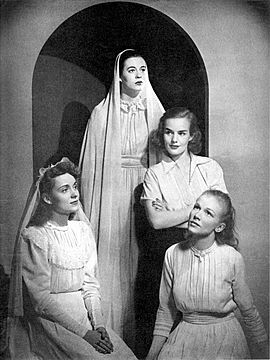
During Golden Boy, Frances had a relationship with Odets. But he was married. Frances felt hurt when he ended their relationship. The theater group chose another actress for the London show. Frances felt the group had used her fame.
Feeling sad, Frances returned to Los Angeles. She starred with her husband Erickson in Ride a Crooked Mile (1938). In April 1939, she performed in a short Broadway play. It was called Quiet City. In November, she returned to Broadway in Thunder Rock. This play was not well-received. Frances was very unhappy after it closed. She then accepted a role in a play based on Ernest Hemingway's The Fifth Column. She decided to leave the production.
She went back to Paramount. They gave her a role in South of Pago Pago (1940). She played Ruby, a woman looking for pearls. Then she worked for Warner Bros. in Flowing Gold. This was an adventure drama about the oil industry.
After this film, Frances returned to the East Coast for summer theater. In spring 1941, she drove back to Los Angeles. She rented a large house. Her next movie was World Premiere (1941). She also had a supporting role in Among the Living (1941).
During this time, Frances was "seeking in work a rest from her personal struggles." She starred as Calamity Jane in the Western Badlands of Dakota. Frances again had disagreements with the studio. She felt her role was too glamorous. This hurt her reputation with studio executives. She next appeared in Son of Fury (1942). Later that year, Paramount stopped her contract. She refused a part in a film. Meanwhile, her marriage to Erickson ended. They divorced on June 12, 1942.
After Hospitalization and Comeback (1950–1958)
On March 23, 1950, Frances was released from the hospital. She went back to her mother's care. A year later, she was officially discharged from the hospital's control. But she did not know this for two years. She thought she might be sent back to the hospital. In June 1953, she found out she was discharged. Frances asked for her mother's legal control over her to be lifted. The court agreed.
With her freedom, Frances got a job. She sorted laundry at the Olympic Hotel in Seattle. This was the same hotel where she had been celebrated in 1936. While working there, a co-worker set her up on a blind date. She met Alfred H. Lobley, a city worker. They married in April 1954. They moved in with Lillian, Frances's mother. Lillian was getting older and needed help. Within a year, Lillian went to a nursing home. Then, Frances's marriage to Lobley started to have problems.
Frances did not see her sister much until Lillian died in March 1955. After their mother's death, Frances's sister Edith moved to Portland, Oregon. She wanted to be closer to their father. He died there in July 1956. Frances and Edith sometimes wrote to each other. Edith said Frances visited her in Portland once. They spent an afternoon at The Grotto. It was a place they had visited with their father.
In late 1957, Frances separated from Lobley. She moved to Eureka, California. She worked as a bookkeeper and secretary. In Eureka, she met Leland C. Mikesell. He was a broadcast promoter from Indianapolis. He recognized her at a local bar. They soon started a relationship. Mikesell thought Frances could make a comeback in her career. They moved to San Francisco. Frances worked as a clerk there for a short time. In 1958, she and Mikesell married.
In a December 1957 interview, Frances said: "I blame nobody for my fall. I had to face agonizing decisions when I was younger. The decisions broke me. But, too, there was a lack of philosophy in my life. With faith in myself and in God I think I have won the fight to control myself." She later appeared on The Ed Sullivan Show twice. On one show, she played guitar and sang "Aura Lee." She had sung this song in Come and Get It (1936). She also appeared on This Is Your Life. She wanted to explain the truth about the stories in the news about her.
In August 1957, Frances returned to the stage. She performed in The Chalk Garden in New Hope, Pennsylvania. In spring 1958, Frances appeared in several live TV dramas. Some of these shows still exist. The same year, she made her last movie, The Party Crashers. It was a drama about teenagers. Then, in July 1958, Frances took the main role in Yes, My Darling Daughter. This play was in Indianapolis.
Stage and Television Work (1959–1964)
Frances's stage work helped her get a new opportunity. She got to host her own daytime movie show. It was called Frances Farmer Presents. A TV executive saw her in The Chalk Garden. He worked for the local NBC station, WFBM-TV (now WRTV). He offered her the show.
The program made her popular as a friendly host. She even received an award as a local businesswoman of the year. By March 1959, news reports said she had separated from Mikesell. He was suing her. In 1959, Frances moved in with Jeanira "Jean" Ratcliffe. Jean was a widow. They became good friends in Indianapolis.
In 1962, Frances appeared in a Purdue University play. It was Anton Chekhov's The Seagull. The next year, her divorce from Mikesell was final. Frances Farmer Presents ended in summer 1964. The station manager fired her in April. He hired her back two months later. But then he fired her for good in late August or early September.
Frances continued her stage work. She accepted a role in a Purdue Summer Theatre play. It was Look Homeward, Angel. In 1965, she played Claire Zachanassian in Purdue's The Visit. This play ran from October 22 to 30, 1965.
During The Visit, Frances was in a driving accident. When police stopped her, she remembered: "Instead of answering as Frances Farmer, I acted like my character in the play. I suddenly became the richest woman in the world. I shouted that I would buy his town. I got out stiff-legged and quoted all the bossy lines I could remember. This did not go well with the police officer. A patrol car took me to jail."
After news reports about the incident, the next night's show of The Visit sold out. Frances did not want to return to the stage. But Ratcliffe encouraged her. Frances wrote about the performance in her book: "There was a long silent pause as I stood there. Then came the loudest applause of my career. The audience ignored the scandal with their ovation." She felt it was "my finest and final performance. I knew I would never need to act onstage again. I felt satisfied and rewarded."
Final Years (1965–1970)
In the early and mid-1960s, Frances was an actress at Purdue University. She spent most of her free time painting and writing poetry. She and Ratcliffe tried to start a small makeup company. Their products worked well. But the project failed. The person handling their money took it.
In 1968, she became a Roman Catholic. She felt God in her life. She believed she needed a "disciplined way of faith and worship." Frances loved the Saint Joan of Arc church. She went to services there often in her last years. During this time, she also stopped drinking. She started thinking about writing a book about her life. She worked with Lois Kibbee. Kibbee encouraged her to record her life story. This was hard for Frances. Especially looking at her medical records from the hospital. The book was not finished. But Ratcliffe used her notes to create Frances's book, Will There Really Be a Morning?, which was published after her death.
Death
In spring 1970, Frances was diagnosed with esophageal cancer. This was linked to her smoking for many years. She was in the hospital for three weeks. Then she went home for a short time. She died from cancer at Indianapolis Community Hospital on August 1, 1970. She is buried at Oaklawn Memorial Gardens Cemetery in Fishers, Indiana.
Filmography
| Year | Title | Role | Notes | Ref. |
|---|---|---|---|---|
| 1936 | Too Many Parents | Sally Colman | ||
| 1936 | Border Flight | Anne Blane | ||
| 1936 | Rhythm on the Range | Doris Halliday | ||
| 1936 | Come and Get It | Lotta Morgan/Lotta Bostrom | Alternative title: Roaring Timber | |
| 1937 | Exclusive | Vina Swain | ||
| 1937 | The Toast of New York | Josie Mansfield | ||
| 1937 | Ebb Tide | Faith Wishart | ||
| 1938 | Ride a Crooked Mile | Trina | Also known as: Escape from Yesterday and The Last Ride | |
| 1940 | South of Pago Pago | Ruby Taylor | ||
| 1940 | Flowing Gold | Linda Chalmers | ||
| 1941 | World Premiere | Kitty Carr | ||
| 1941 | Badlands of Dakota | Calamity Jane | ||
| 1941 | Among the Living | Elaine Raden | ||
| 1942 | Son of Fury: The Story of Benjamin Blake | Isabel Blake | ||
| 1943 | I Escaped from the Gestapo | Montage sequence | Alternative title: No Escape (UK) | |
| 1951 | Studio One | Episode: "They Serve The Muses" | ||
| 1951 | Studio One | Episode: "The Dangerous Years" | ||
| 1958 | Playhouse 90 | Val Schmitt | Episode: "Reunion" | |
| 1958 | Matinee Theatre | Episode: "Something Stolen, Something Blue" | ||
| 1958 | Studio One | Sarah Walker | Episode: "Tongues of Angels" | |
| 1958 | The Party Crashers | Mrs. Bickford | ||
| 1958–1964 | Frances Farmer Presents | Host | ||
| 1959 | Special Agent 7 | Episode: "The Velvet Rope" |
Stage Credits
| Date(s) | Title | Role | Notes | Ref. |
|---|---|---|---|---|
| November 4, 1937–June 1938 | Golden Boy | Lorna Moon | 248 performances | |
| April 16–April 23, 1939 | Quiet City | Belasco Theatre | ||
| November 14–December 2, 1939 | Thunder Rock | Melanie | Mansfield Theatre; 23 performances | |
| July 1957–1958 | The Chalk Garden | Miss Madrigal | Bucks County Playhouse; touring production | |
| March 8–March 16, 1963 | The Seagull | Madame Irina Trepleff | Loeb Playhouse | |
| October 22–October 30, 1965 | The Visit | Claire Zachanassian | Loeb Playhouse; 8 performances |
Images for kids
-
From left to right: Martha Scott, Uta Hagen, Frances Farmer, and Julie Haydon in Stage magazine, 1938.
See also
 In Spanish: Frances Farmer para niños
In Spanish: Frances Farmer para niños
 | James B. Knighten |
 | Azellia White |
 | Willa Brown |


